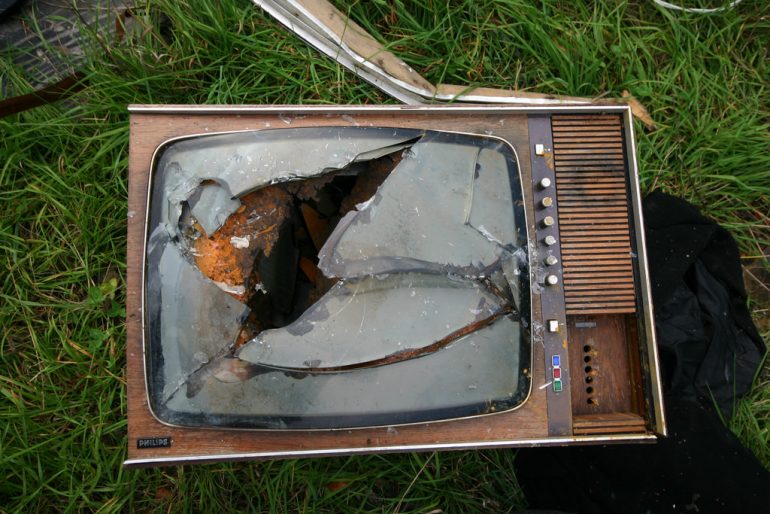Are we doomed? Friends and families in casual conversation point to news and say, “Well, just look at how often you hear about another school shooting on TV” as proof that the world is, in fact, not getting better but rather the opposite. Though many feel this way, Steven Pinker, cognitive psychologist and author, challenges the belief that the world is coming to an end and argues in his book “Enlightenment Now: the Case for Reason, Science, Humanism, and Progress” that the world is improving and that society has never been at a better point in history—that the media is the master puppeteer in all of it.
Pinker asserts that since the early 1970s, the news has gotten more negative, feuling the world’s availability bias—making people think that terrible incidents occur far more often than they actually do. He states that, “we never see a journalist saying to the camera, ‘I’m reporting live from a country where a war has not broken out.’” That’s true. But the reason for this is not because of a journalist’s zeal to be the watchdog or muckraker of society as he states; it’s because journalists are hired to report the happenings of the world and to hold the attention of their viewers, and playing Captain Obvious is just not going to get that attention. The role of media is to report on the change of the status quo, a change from peacetime to wartime and wartime to peacetime, not the banal continuation of peacetime.
Throughout “Enlightenment Now,” Pinker stresses the adverse effects media has on a person’s availability bias as one of the root causes for the world’s blindness to clear progress in fields such as global wealth, education, and even the decline of war. But Pinker fails to mention the positive role that media and news coverage has on the boon of education and knowledge. He mentions in passing the inclusivity of the internet but neglects the fact that journalists and news outlets, unlike anonymous users of social media sites, have a code of ethics and are encouraged to offer the masses reliable and accurate reporting.
Media is a buyer’s market which Pinker neglects to acknowledge—if a person doesn’t like the headline, they won’t pick up the newspaper or subscribe to the online membership. News outlets know that without people reading or seeing their reports, they’ll be out of business in no time. It’s in the best interest of journalists to keep the attention of loyal followers along with attracting new customers, and the best way to do that is to make something that people like. Pinker is right—a journalist has never reported from a country that has not broken out to war; and if the news did report such news., we’d never never know because no one would pay attention. It’s the viewer’s interest in tragic news that keeps it on the front pages of news sites and filling the airtime of T.V. news giants. And if it bothers people so much that news is often negetive, then make the switch to reading publishers who report on less tragic news.
The assumption that people can’t discern probability from reportability is as insulting as saying video games are causing violence in children. Furthermore, if people have the mental capacity to understand that news outlets are a business that depend on people actually taking interest in what is reported, then it isn’t too far a jump to see that bad news sells and media is at the behest of what the consumer wants.
Pinker is not the first individual in history to point blame at media for the ills of a society, though. Going as far back as Plato’s “The Republic,” Socrates felt that media was perhaps more damaging than good. Socrates stated that children are incapable of interpreting the allegorical stories of the Greek gods; hence parents should not tell certain graphic tales for fear of the children believing that such horrors were normal.
Pinker blaming the media for causing for people’s despondent and “what’s the point—we’re all going to die” mentality demonstrates a lack of trust in the masses, to say the least. Back in ancient Greece, education and multiple news sources were not the norm, so it’s understandable to think that individuals without a way to further their knowledge and expand their points of view on a global scale might believe everything they hear.
As insightful as Socrates’ concerns may have been at the time, that was more than 2000 years ago and civilization has made some substantial strides in the world of mass media. Now more than ever, proven by Pinker’s own statistics, people are capable of realizing that the plane they’re about to board is most likely not going to fall out of the sky, even though the news might make it feel like disaster is just around the corner. A person can think for themselves and realize that where current wars are fought is only in one region of the globe rather than lurking around every corner as it was during the World Wars. And a person is capable of doubting that what they hear on CNN, MSNBC, or Fox News, is the status quo of the entire world.
The role that mass media plays in modern society is something that is talked about profusely on the news, ironically. Oftentimes, media is pointed to as the cause of societal anxiety, fear, and belief that the world is coming to an end. It’s seen as the bringer of overwhelming amounts of information that younger generations just can’t handle. But in reality, mass media and information transfer is one thing that has always been seen as an accomplishment for all of mankind. The invention of the printing press, the transatlantic telegraph cable, and the radio are taught in schools as historical achievements that made the world more accessible and easier to understand. In history books, the radio is seen as a revolutionary invention, and nowhere does it say that the grandfathers of the time were right in their belief that newspapers were sufficient in transmitting the news.
This article originally appeared in the print edition of our June 2018, issue.





